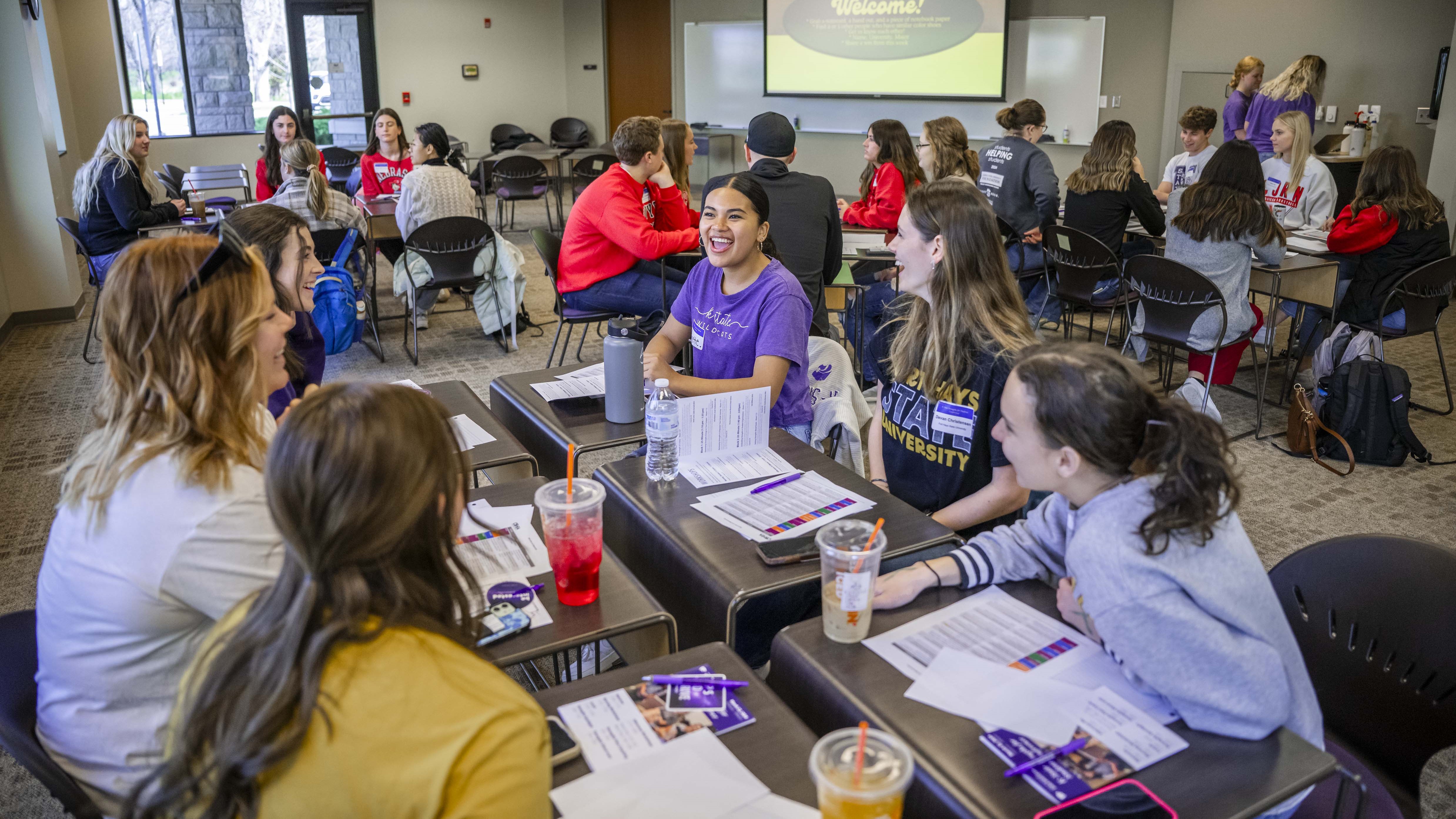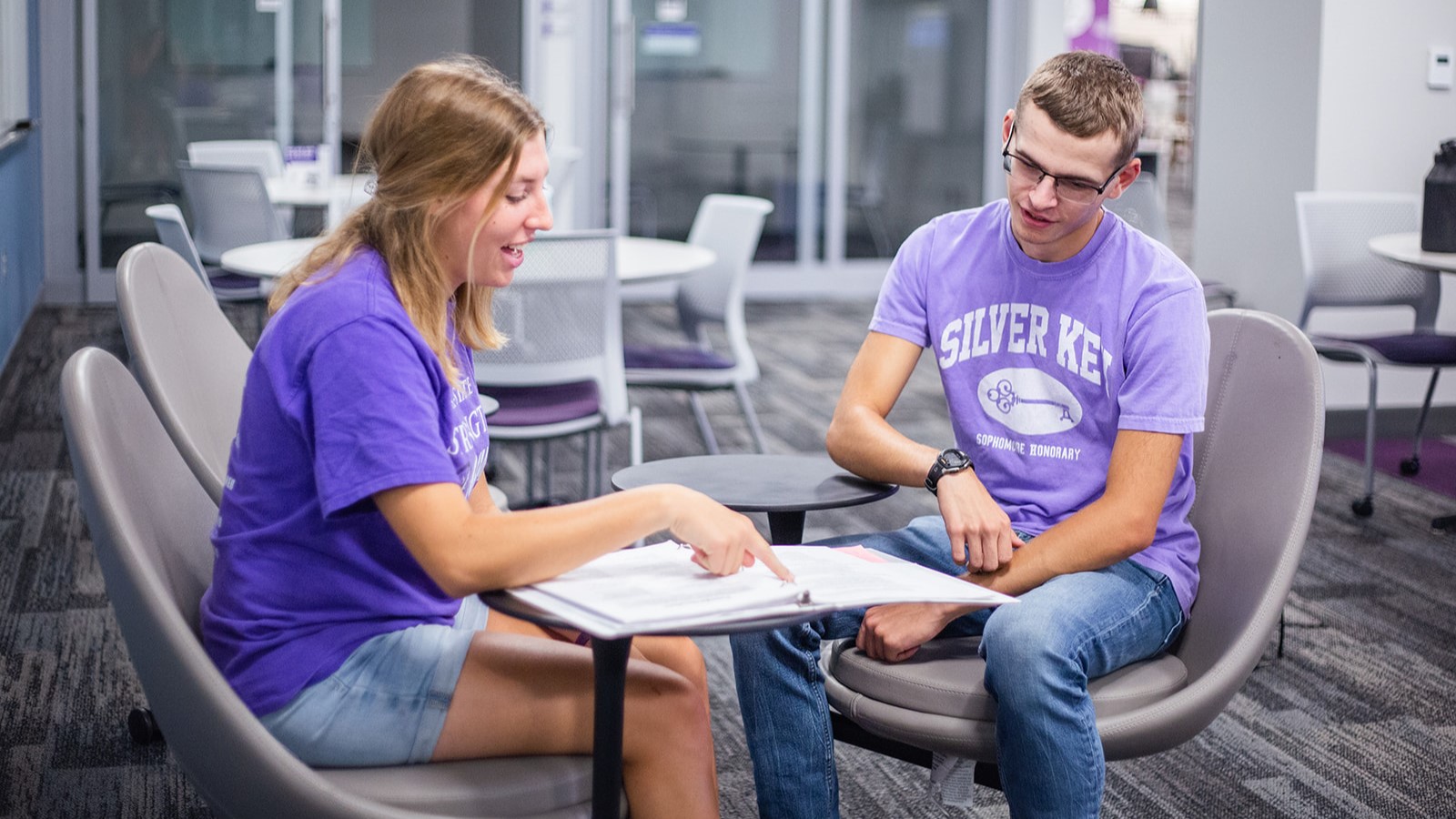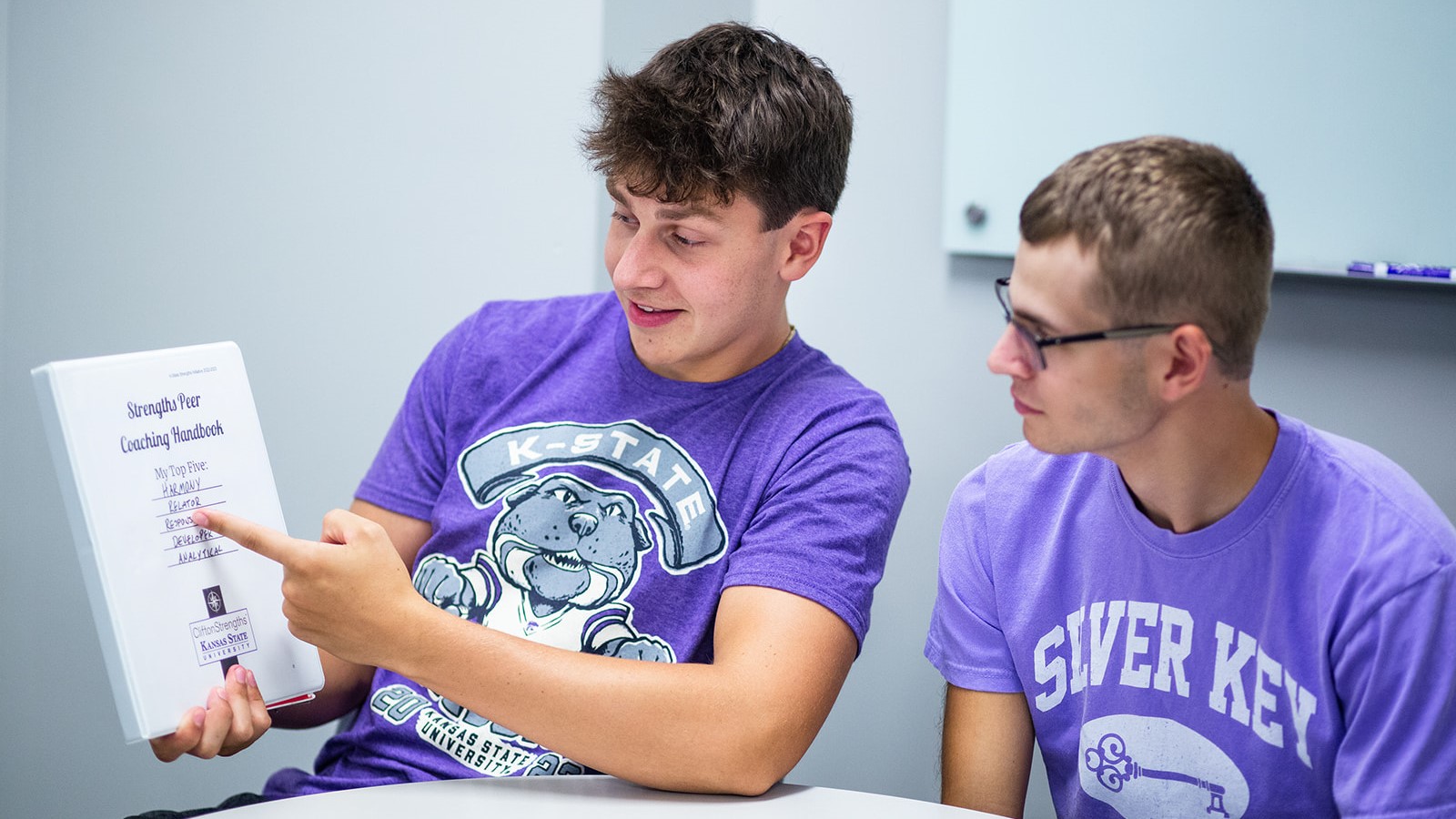How K-State Strengths has inspired and empowered students for more than a decade
When K-State faculty began experimenting in 2008 with adding the CliftonStrengths
assessment into the introduction to leadership course, Dr. Mike Finnegan ’00, ’13
knew the university was onto something special.
CliftonStrengths is an online assessment tool that helps you discover your top five
natural talents, thus turning your talents into strengths. At the end of the semester,
students reported back that they saw value in identifying their strengths — ranking
it as highly as “Boscology 101” from retired vice president for student life and dean
of students Pat Bosco ’71, ’73, and the famous FISH! Philosophy lesson with actual fish tossing in class (no, really!).
“We knew we found something that students were gravitating towards,” said Finnegan,
assistant professor in the Staley School of Leadership and now director of K-State
Strengths. “Leadership students started to see that ‘If I just leverage my strengths,
I’ll have the confidence to exercise leadership in my own unique way.’ Strengths becomes
a common language students use speaking to their own uniqueness as to how they contribute
to teams. And so then the idea was, well, how do we scale this?”
The program found a champion in K-State alum Richard Mistler ’62, whose initial philanthropy
allowed the university to purchase access codes so all incoming students could take
the CliftonStrengths assessment for free.
A number of faculty and staff members on campus also served as early champions for
the program, and the university searched for more ways to integrate strengths into
the classroom and student life, Finnegan said. For a time, the program was overseen
by K-State’s career services, then new student services. And now it has come full
circle, back with the Staley School of Leadership. The Mistler family endowed the
program so it could continue to be offered to students for many years to come, aimed
at increasing student engagement and well-being.
For Caden Gurwell, a K-State senior studying operations and supply chain management
with a minor in leadership studies, K-State Strengths is all about “understanding
what you're good at, and then learning how to become great at it.” His top five strengths
are Harmony | Relator | Responsibility | Developer | Analytical.
“Strengths are things that are already there,” Gurwell said. “A strength is a talent
times practice. And so the more that I take something that I'm already good at and
I put it into practice, the more of a strength that actually becomes. It's also something
that can be cultivated and developed. I feel like when you look at the top five strengths,
and what that actually means, they just feel much more tangible and practical, things
that I can use on a daily basis.”
Making it stick
On average, about 2,700 students take the assessment every year. Finnegan said that
faculty and staff are constantly searching for creative ways to make the program “sticky”
— incorporating K-State Strengths into a variety of classes and conversations so students
continue to engage after they’ve taken the assessment and learned their top five strengths.
It could be a topic in an academic advising session; part of fraternity, sorority
or student organization leadership team building; joint conferences with other schools
to discuss CliftonStrengths; or even included in a student’s campus email signature.
“They look at their strengths assessment, and they start to make connections,” Finnegan
said. “‘I'm seeing how my strengths can productively apply to the work and what it
is that I'm learning in the classroom.’”
Finnegan also has learned more about himself as a person and as an educator through
the program. His top five strengths are: Woo | Communication | Positivity | Maximizer
| Adaptability.
“So that's just yet another reminder that when students come into my class, I want
them to see and feel the positivity and energy in the classroom, how much I love what
it is that I do, and how important it is for students to invest in their leadership
education and development.”
The top five most frequently reported strengths across campus at K-State are: Restorative
| Achiever | Relator | Harmony | Adaptability.
“Restorative people are really good at solving problems,” Finnegan said. “And I think
that just speaks to the grittiness and resiliency of our students to navigate obstacles
and still push forward for progress.”
Students helping students
The program currently has 10 K-State Strengths peer coaches, allowing students to
mentor fellow students. The peer coaches learn powerful skills such as asking insightful
questions and how to be an active listener.
“Throughout the academic year, we're coaching approximately 800 plus students with
a follow up conversation about their top five strengths,” Finnegan said. “How cool
is it that a strengths peer coach can include on their resume that I've sat down one
on one and coached my peers towards either academic or personal success around their
top five strengths. And so by the time that they graduate, they can say, ‘Gosh, I've coached
anywhere from 50 to over 200 students in their own strengths development.’”
Gurwell is one of those student peer coaches. He said he enjoys helping other students
discover the same sense of direction and confidence that the program has given him.
“It opened my eyes a lot to not only the strengths, but also just the impact that you
can have on students, especially freshmen, who are just trying to figure themselves
out and figure out what they want their lives to look like,” he said. “I'm meeting
just such a vast group of students, they're all so different, coming from completely
different walks of life. Just trying to help them develop their strengths, which,
in turn, helps me develop my own. Essentially helping them understand what they're
good at, and then how they can become great at it, and how they can utilize their
strengths while they're in college.”
An ongoing legacy
As Finnegan reflects on the legacy of K-State Strengths, he says he’s grateful for
Rich Mistler helping make all this possible. Although Mistler passed away earlier
this year, his vision for the program continues to make an impact.
“When I think about Rich's gift to K-State, I just always think about the word generativity
and how he invested in the next generation of students focusing on student personal
and academic success,” Finnegan said. “And again, that's just a great feel-good story
of K-Staters giving back to K-Staters. Rich was always really excited about increasing
student engagement, student well-being, and so that's a space where I think strengths
is adding to the multiple resources across campus. Strengths is just another opportunity
and pathway to build a connection with your peers to feel a sense of belonging here
at the university.”
One of the students Mistler made a difference for is K-State graduate Kristen O’Shea
’14, who now owns her own strengths-related business, O'Shea Strengths Coaching.
"Initially uncovering my Gallup CliftonStrengths was eye opening for me as a freshman,”
she said. “Then I had advisers help me develop my strengths while on campus, which
felt like having a coach who could speak my own unique language. The biggest gifts
were increased confidence, self-awareness and others awareness, which have helped
me have a life I deem successful."



